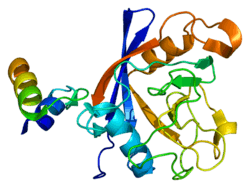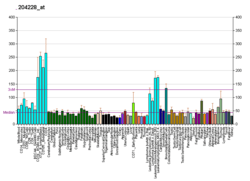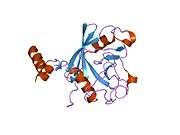PPIH
Peptidyl-prolyl cis-trans isomerase H is an enzyme that in humans is encoded by the PPIH gene.[5][6][7]
The protein encoded by this gene is a member of the peptidyl-prolyl cis-trans isomerase (PPIase) family. PPIases catalyze the cis-trans isomerization of proline imidic peptide bonds in oligopeptides and accelerate the folding of proteins. This protein is a specific component of the complex that includes pre-mRNA processing factors PRPF3, PRPF4, and PRPF18, as well as U4/U5/U6 tri-snRNP. This protein has been shown to possess PPIase activity and may act as a protein chaperone that mediates the interactions between different proteins inside the spliceosome.[7]
References
- 1 2 3 GRCh38: Ensembl release 89: ENSG00000171960 - Ensembl, May 2017
- 1 2 3 GRCm38: Ensembl release 89: ENSMUSG00000060288 - Ensembl, May 2017
- ↑ "Human PubMed Reference:".
- ↑ "Mouse PubMed Reference:".
- ↑ Horowitz DS, Kobayashi R, Krainer AR (Dec 1997). "A new cyclophilin and the human homologues of yeast Prp3 and Prp4 form a complex associated with U4/U6 snRNPs". RNA. 3 (12): 1374–87. PMC 1369579
 . PMID 9404889.
. PMID 9404889. - ↑ Teigelkamp S, Achsel T, Mundt C, Gothel SF, Cronshagen U, Lane WS, Marahiel M, Luhrmann R (May 1998). "The 20kD protein of human U4/U6.U5 tri-snRNPs is a novel cyclophilin that forms a complex with the U4/U6-specific 60kD and 90kD proteins". RNA. 4 (2): 127–41. PMC 1369602
 . PMID 9570313.
. PMID 9570313. - 1 2 "Entrez Gene: PPIH peptidylprolyl isomerase H (cyclophilin H)".
Further reading
- Reidt U, Reuter K, Achsel T, et al. (2000). "Crystal structure of the human U4/U6 small nuclear ribonucleoprotein particle-specific SnuCyp-20, a nuclear cyclophilin". J. Biol. Chem. 275 (11): 7439–42. PMID 10713041. doi:10.1074/jbc.275.11.7439.
- Horowitz DS, Lee EJ, Mabon SA, Misteli T (2002). "A cyclophilin functions in pre-mRNA splicing". EMBO J. 21 (3): 470–80. PMC 125845
 . PMID 11823439. doi:10.1093/emboj/21.3.470.
. PMID 11823439. doi:10.1093/emboj/21.3.470. - Strausberg RL, Feingold EA, Grouse LH, et al. (2003). "Generation and initial analysis of more than 15,000 full-length human and mouse cDNA sequences". Proc. Natl. Acad. Sci. U.S.A. 99 (26): 16899–903. PMC 139241
 . PMID 12477932. doi:10.1073/pnas.242603899.
. PMID 12477932. doi:10.1073/pnas.242603899. - Reidt U, Wahl MC, Fasshauer D, et al. (2003). "Crystal structure of a complex between human spliceosomal cyclophilin H and a U4/U6 snRNP-60K peptide". J. Mol. Biol. 331 (1): 45–56. PMID 12875835. doi:10.1016/S0022-2836(03)00684-3.
- Ingelfinger D, Göthel SF, Marahiel MA, et al. (2004). "Two protein–protein interaction sites on the spliceosome-associated human cyclophilin CypH". Nucleic Acids Res. 31 (16): 4791–6. PMC 169899
 . PMID 12907720. doi:10.1093/nar/gkg660.
. PMID 12907720. doi:10.1093/nar/gkg660. - Gerhard DS, Wagner L, Feingold EA, et al. (2004). "The Status, Quality, and Expansion of the NIH Full-Length cDNA Project: The Mammalian Gene Collection (MGC)". Genome Res. 14 (10B): 2121–7. PMC 528928
 . PMID 15489334. doi:10.1101/gr.2596504.
. PMID 15489334. doi:10.1101/gr.2596504. - Andersen JS, Lam YW, Leung AK, et al. (2005). "Nucleolar proteome dynamics". Nature. 433 (7021): 77–83. PMID 15635413. doi:10.1038/nature03207.
- Rual JF, Venkatesan K, Hao T, et al. (2005). "Towards a proteome-scale map of the human protein-protein interaction network". Nature. 437 (7062): 1173–8. PMID 16189514. doi:10.1038/nature04209.
This article is issued from
Wikipedia.
The text is licensed under Creative Commons - Attribution - Sharealike.
Additional terms may apply for the media files.







